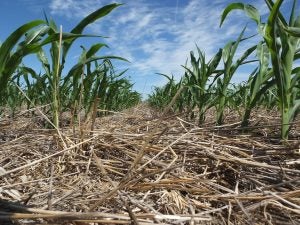
World Food Day has come and gone, with food security still out of reach for people and planet
Every October, the global community comes together to celebrate the founding of the United Nations Food and Agriculture Organization as World Food Day. Taking stock, it is plain to see just how far we still have to go to achieve the FAO’s founding mission to defeat hunger and improve nutrition and food security for the planet.
The obstacles to achieving this goal are many and complex: the COVID-19 pandemic, the war in Ukraine, and the ongoing challenges of conflict, water shortages, flooding, and rising food costs are just a few. However, they all share one thing in common: they are exacerbated by the existential threat of climate change.
With less than a month to go before the 27th United Nations Climate Change Conference (COP 27) in Egypt, world leaders must consider the importance of addressing food insecurity as a part of solving the climate crisis.
Our current approach to providing equitable, sustainable nutrition for the world’s inhabitants is failing both people and nature. While our global food system produces enough food to feed 1.5 times the current global population, we are seeing increases in the number of people suffering from hunger and malnutrition.
And at the same time, our global food system is contributing significantly to the global climate crisis, with nearly one-third of global greenhouse gas emissions coming from the agricultural sector. Food production is also a major cause of land degradation and loss of biodiversity.
Nowhere is this year’s theme for World Food Day – No One Left Behind – felt more urgently than the continent of Africa, where the impacts of climate change and global crises have created sustained food insecurity.
On the same continent where international delegates will gather for COP 27 in a few weeks, farmers in the Horn of Africa are struggling in an increasingly drought-stricken environment, while families deal with soring fertilizer costs and food shortages. This is a very steep price to pay for a region that contributes a mere fraction of greenhouse gas emissions to the climate crisis compared to other major emitters like China, Europe and the United States.
African leaders and experts are rightly calling for attention to these concerns and the need to address the financing for losses and damages caused by climate change, and the importance of sustained finance for climate adaptation in impacted communities. Recently, the Pan African Climate Justice Alliance, a consortium of over 1000 organizations, launched their “Climate Justice Torch Campaign” at the Africa Climate Week in Gabon, calling for COP delegates to address the serious climate impacts on the people and natural resources of African countries.
Within this landscape, EDF is focused on moving from awareness of the problem to advocating for climate-smart and cost-effective mitigation strategies that have a positive impact on both people and nature. This includes empowering and equipping food system actors, including producers and communities, to thrive under changes already being felt, and to be a part of the climate solution. EDF is working to:
- co-create tool sets with communities on the ground, documenting sustainable food system challenges and opportunities in different geographies and re-aligning incentives that communities and countries can act upon;
- shift public and private investment and finance systems that build for future rather than past conditions;
- reevaluate food for its nutritional as well as environmental footprints – including water use, biodiversity, deforestation and greenhouse gas emissions;
- help develop and deliver new technologies and other innovations across agricultural, fisheries and water systems in integrated and locally relevant ways; and
- change the global dialogue to embed climate resilience and mitigation into food systems decision-making.
We can celebrate the progress we’ve made to combat the twin challenges of hunger and climate change – while still acknowledging that the road ahead is a long and rocky one. It’s my hope that, in the coming weeks, global leaders meeting in Egypt and beyond will head calls to address the global food crisis and build resilient food supply into their national strategies to address both climate change and food insecurity.










